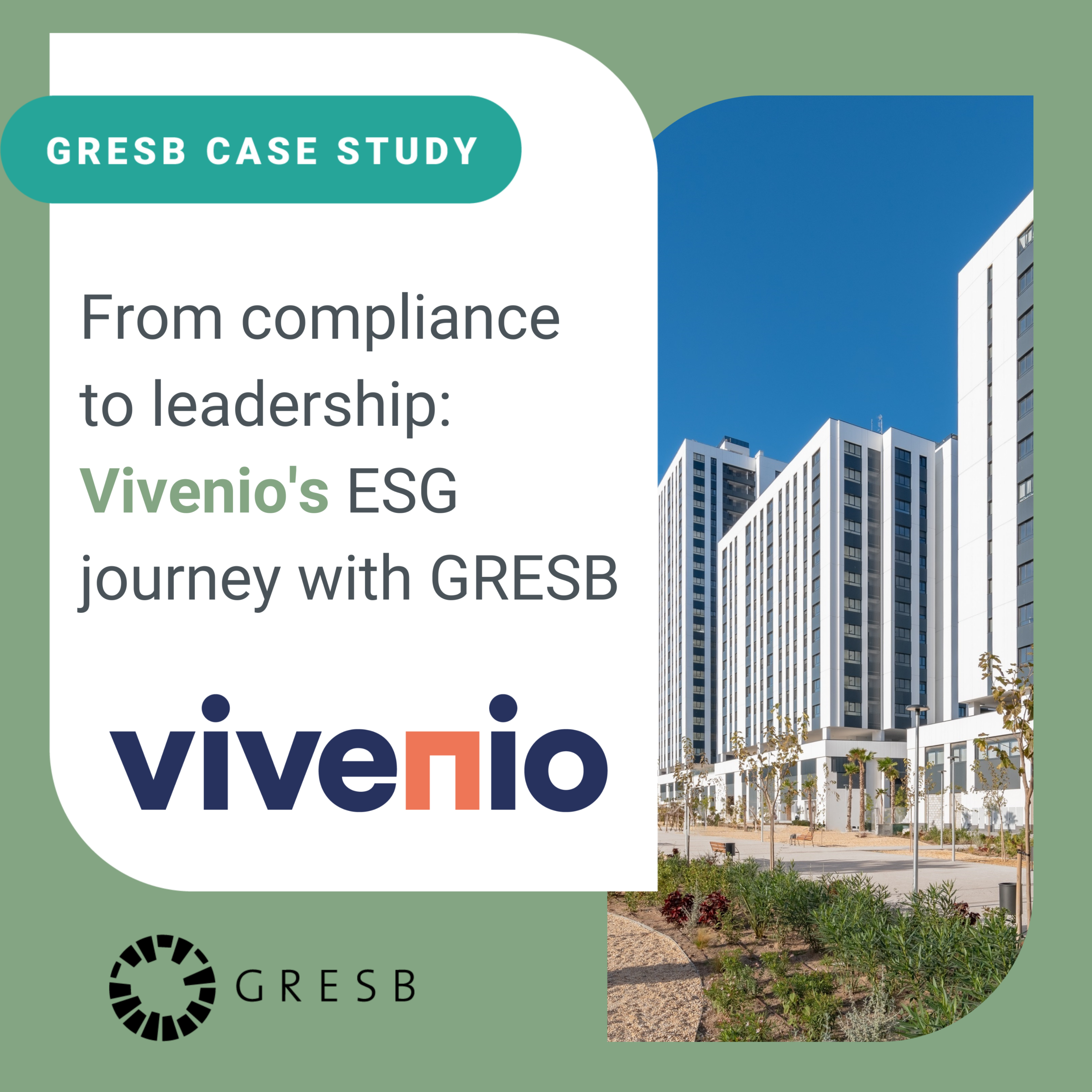About Vivenio Residencial Socimi S.A.
Vivenio Residencial Socimi S.A. is a property company whose corporate purpose is the development, acquisition, and management of residential properties for rental purposes in Spain.

Business type: Property company
Region: Europe, with a focus on Spain
Gross asset value: EUR 1.425 billion as of December 2022
Use of GRESB: GRESB Real Estate Assessment
Focus on ESG:
Vivenio’s near-term priority is the approval of their proposed net-zero policy. The policy will:
- Serve as a roadmap to 2030 and 2050
- Outline measures to reduce greenhouse gas emissions
- Provide a decarbonization plan to prioritize energy efficiency and renewable energy goals
Catering to investor needs with GRESB data
Vivenio, a prominent player in the Spanish real estate sector, has made significant strides in its journey towards sustainability. Since 2019, Vivenio has been participating in the GRESB Real Estate Assessment, which has enabled the company to leverage the GRESB benchmarks and data to quantify its sustainability efforts and drive improvements.
“The GRESB benchmarks have become a vital tool to quantify and compare our sustainability performance with industry peers within the listed residential sector in Europe,” said Antonio Cereceda, Sustainability Manager at Vivenio.
“Reporting to GRESB annually has been instrumental in providing investors easy access to our ESG data, which is a crucial consideration for our primary investor base of pension funds,” he continued.
The continuous participation in the GRESB assessment has also catalyzed a significant transformation in Vivenio’s sustainability endeavors. Notable improvements include enhanced data monitoring, more robust environmental policies, and comprehensive climate-related risk assessments.
Vivenio’s investors, who prioritize sustainability, find GRESB invaluable as it allows them to benchmark Vivenio’s efforts effectively. Aside from its investor base, Vivenio has also organized internal meetings and workshops for its leadership and employees to educate them about the importance of GRESB and sustainability within the company’s strategy. Vivenio’s commitment to sustainability is further underscored by achieving a 100% green building certified portfolio in 2022.
From management duty to strategic imperative
Vivenio’s perspective on ESG reporting and benchmarks has evolved rapidly since joining GRESB in 2019. Initially considered a management duty, GRESB reporting has now become an integral part of the company’s business strategy. Top management has shifted their focus towards ESG objectives, with sustainability efforts diversifying to encompass GRESB, building certifications, a net-zero policy, and more.
Some of the key actions Vivenio undertook on its sustainability journey include prioritizing data monitoring for environmental indicators, such as energy and water consumption. They have also expanded their sustainability team to enhance planning, implementation, monitoring, and reporting of sustainability measures. Vivenio now has a dedicated employee responsible for ESG who ensures that the company’s strategy and efforts are put into practice effectively. Additionally, the company also established a Sustainability Committee at the board level to oversee and report on all ESG actions.
Vivenio’s commitment to sustainability has been recognized with a GRESB 5-star rating and the top position in the “Europe: Listed Residential” peer group, reflecting their dedication to effective ESG practices. Reflecting on Vivenio’s accomplishments, Cereda described their work as “an excellent result after several years of hard work to improve our sustainability performance that aptly reflects our high commitment to ESG.”
Looking ahead to 2024 and beyond
Vivenio’s primary sustainability objective for the near future is the approval of its net-zero policy.
“This policy will serve as our roadmap to 2030 and 2050, outlining measures to reduce our greenhouse gas emissions alongside a decarbonization plan to prioritize energy efficiency and renewable energy goals. GRESB will play a role in monitoring and assessing the performance of these goals on an annual basis,” said Cereceda.
“Additionally, embodied carbon emissions of construction materials are expected to become more important in the real estate sector as energy efficiency and energy decarbonization increases in buildings drive lower emissions in the operational stage,” added Cereceda. “As such, going forward, Vivenio will also start to carry out Life Cycle Assessment in its new developments to measure embodied emissions of construction materials,” he concluded.